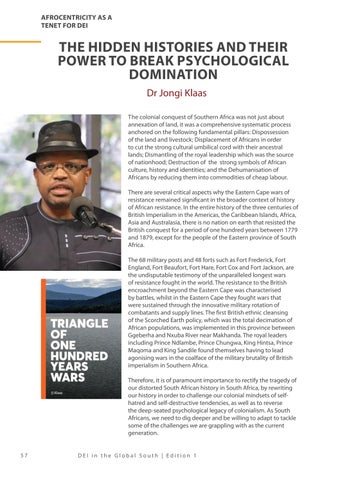AFROCENTRICITY AS A TENET FOR DEI
THE HIDDEN HISTORIES AND THEIR POWER TO BREAK PSYCHOLOGICAL DOMINATION Dr Jongi Klaas The colonial conquest of Southern Africa was not just about annexation of land, it was a comprehensive systematic process anchored on the following fundamental pillars: Dispossession of the land and livestock; Displacement of Africans in order to cut the strong cultural umbilical cord with their ancestral lands; Dismantling of the royal leadership which was the source of nationhood; Destruction of the strong symbols of African culture, history and identities; and the Dehumanisation of Africans by reducing them into commodities of cheap labour. There are several critical aspects why the Eastern Cape wars of resistance remained significant in the broader context of history of African resistance. In the entire history of the three centuries of British Imperialism in the Americas, the Caribbean Islands, Africa, Asia and Australasia, there is no nation on earth that resisted the British conquest for a period of one hundred years between 1779 and 1879, except for the people of the Eastern province of South Africa. The 68 military posts and 48 forts such as Fort Frederick, Fort England, Fort Beaufort, Fort Hare, Fort Cox and Fort Jackson, are the undisputable testimony of the unparalleled longest wars of resistance fought in the world. The resistance to the British encroachment beyond the Eastern Cape was characterised by battles, whilst in the Eastern Cape they fought wars that were sustained through the innovative military rotation of combatants and supply lines. The first British ethnic cleansing of the Scorched Earth policy, which was the total decimation of African populations, was implemented in this province between Ggeberha and Nxuba River near Makhanda. The royal leaders including Prince Ndlambe, Prince Chungwa, King Hintsa, Prince Maqoma and King Sandile found themselves having to lead agonising wars in the coalface of the military brutality of British imperialism in Southern Africa. Therefore, it is of paramount importance to rectify the tragedy of our distorted South African history in South Africa, by rewriting our history in order to challenge our colonial mindsets of selfhatred and self-destructive tendencies, as well as to reverse the deep-seated psychological legacy of colonialism. As South Africans, we need to dig deeper and be willing to adapt to tackle some of the challenges we are grappling with as the current generation. 57
DEI in the Global South | Edition 1



































